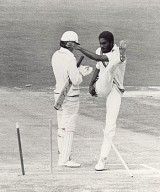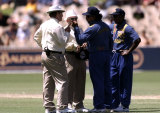
|

Michael Holding uproots the stumps with a graceful kick against New Zealand in 1980
© Getty Images
|
|
It is the first time in the game's long history that a Test match has been forfeited but Pakistan's protest against an umpiring decision at The Oval on Sunday that cost them the fourth and final Test against England and - possibly serious disciplinary action against captain, Inzamam-ul-Haq - was not the first of its kind. At least four times in the past, teams have taken, or threatened, similar action in international matches. In each case, the objection was brief enough for the match to continue; in each case, it emphasised the depth of feeling that can be created by perceived injustice and discrimination on the part of the officials.
The comparison with the present trouble that is most readily identifiable by West Indians occurred during the West Indies' tour of New Zealand in February 1980. Captain Clive Lloyd and his players were convinced they were victims of mistreatment since they arrived in the country from Australia, where they drew a three-match series. This was compounded by what they regarded as blatantly biased umpiring.
At a crucial stage on the last day of the first Test, which they lost by one wicket, fast bowler Michael Holding vented his frustration by kicking over the stumps with a full, graceful swing of his right foot after yet another appeal, this for a wicketkeeper's catch, had been turned down. When what they felt were several obvious decisions again went against them in the second Test, West Indies delayed their return to the field after tea on the second day for 12 minutes as a mark of protest.
"This was something we had to sort out," Willie Rodriguez, the mamager, said at the time. "We had to make a protest which would be meaningful but would not jeopardise the future of West Indies cricket or of the players themselves."
During the interval, they unsuccessfully pressed the New Zealand authorities for the removal of one umpire, Fred Goodall, who they came to view with the same suspicion Pakistan have presently developed for the Australian, Darrell Hair. There was further controversy on resumption as fast bowler Colin Croft barged into Goodall on his run-up, an action not unexpectedly viewed by New Zealanders as deliberate. At the end of play, West Indies removed all their gear from the dressing room and during the next day, the rest day, discussed abandoning the tour altogether.
It took an international telephone call from manager Rodriguez to Jeffrey Stollmeyer, the president of the West Indies Cricket Board of Control (WICBC), and Peter Short, another WICBC member, to spell out what the repercussions of such action would be on West Indies cricket and the players. The tour duly continued, Lloyd publicly apologised to the WICBC and the New Zealand Cricket Council on behalf of the team, while Holding and Croft made their own apologies for their actions. But the tension remained and the acrimony the tour created has not been forgotten to this day.
A year later, almost to the day, at the Melbourne Cricket Ground, Sunil Gavaskar, incensed by an lbw decision against him by Australian umpire Rex Whitehead, stormed off towards the dressing-room, ordering fellow opener Chetan Chauhan to follow him. Only the intervention on the boundary's edge of SK Durani, the team manager, persuaded Chauhan to return to the middle, pointing out, as Stollmeyer and Short had done to the West Indies a year earlier, what the consequences would be if he didn't and the match was abandoned. So the Test continued and, as it happened, India won by 59 runs as Australia collapsed to 83 all out in their second innings.

|

Arjuna Ranatunga in a heated exchange with Ross Emerson who no-balled Muralitharan during an ODI in 1999
© Getty Images
|
|
In December 1984, it was another umpiring decision that brought the third Test between Pakistan and New Zealand to a halt. Ironically, several of the same New Zealanders involved in the disagreeable series against the West Indies four years earlier were to the forefront.
Wisden reported that when Javed Miandad was given not out by Pakistan umpire Shakoor Rana on an appeal for a catch by wicketkeeper Ian Smith, "the game was held up as the fielders gathered near the pavilion and refused to go back to resume play".
"It required persuasion from other senior members of the touring team for the captain, Jeremy Coney, to let the game continue," it added. The matter had simmered since the second Test after which Coney and the manager issued a complaint against the standard of umpiring. The flare-up in the next Test was not entirely surprising.
Another match that was placed in jeopardy by one team's reaction to an umpire's judgment was the one-day international between England and Sri Lanka at the Adelaide Oval in January 1999. The Sri Lankans were already indignant over the no-balling of offspinner Muttiah Muralitharan in the Melbourne Test two years earlier (from both ends) by Hair, the same umpire at the centre of the present controversy. When another Australian official Ross Emerson called Muralitharan from square-leg in this match, captain Arjuna Ranatunga led his players towards the boundary and play was halted for 15 minutes. The Sri Lankan team management immediately got in touch with the board in Colombo by mobile phone and was advised that the team should keep playing. It did and won by one wicket.
There was a common thread running through the previous incidents. The umpires concerned were all from the host country. This can no longer be the case. The continuing charges of patriotic partiality prompted Imran Khan to influence his board to appoint John Hampshire and John Holder, from England's panel, to stand in a home series against India in 1989, the first instance of 'neutral' umpires.
The ICC followed suit a decade later, establishing what it called an 'elite panel' of eight for all Tests with the stipulation that none could stand in matches involving their national team. While that has eradicated the previous suspicion of nationalistic bias, it cannot prevent the antagonism that develops within certain teams towards officials they are convinced have it in for them.
And it is Pakistan's long held and clearly expressed distrust of Darrel Hair that has led to the current crisis.

